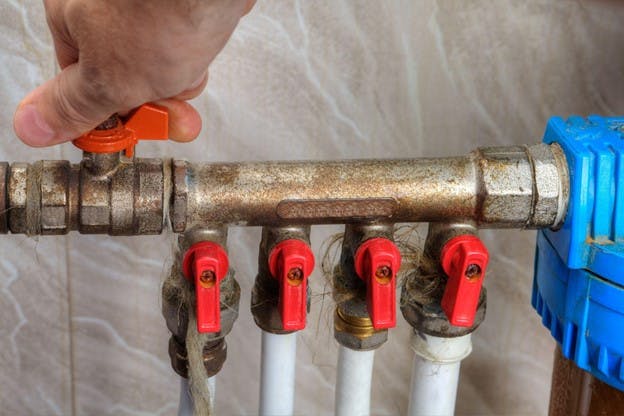Just how do you feel on the subject of 10 Reasons for Low Water Pressure in Your House?

Low water stress in your home can be an irritating trouble, impacting everything from showering to cleaning recipes. If you're experiencing weak water flow, there are a number of feasible causes and services to discover. In this overview, we'll go over common reasons for low water pressure and sensible steps to attend to the concern effectively.
Intro to Low Water Stress
Low tide stress happens when the flow of water from your taps, showers, and various other components is weaker than typical. This can make everyday tasks much more tough and much less effective. Recognizing the causes of low water pressure is critical to locating the best option.
Common Root Causes Of Low Water Pressure
Faulty Pressure Regulators
Pressure regulatory authorities are responsible for preserving constant water stress in your house. If they malfunction, it can result in low tide pressure or unequal circulation throughout your house.
Local Water System Issues
Occasionally, the problem lies outside your home. Metropolitan water supply problems, such as main line leaks or maintenance job, can briefly reduce water pressure in your location.
Pipe Obstructions
Over time, pipes can end up being clogged with mineral deposits, sediment, or debris, restricting the flow of water. This is a typical problem in older homes with galvanized steel pipes.
Deterioration
Deterioration within pipelines can lead to leaks and minimized water pressure. Rust build-up can tighten water flow, especially in aging plumbing systems.
How to Identify Low Water Pressure
Checking Pipelines
Evaluate noticeable pipes for indications of leakages, rust, or obstructions. Pay attention to any type of uncommon noises, such as knocking or rattling pipes, which might suggest concerns within the plumbing system.
Consulting with a Plumber
If you're unable to determine the reason for low water pressure, take into consideration hiring a specialist plumber to conduct an extensive inspection. They can determine underlying problems and recommend appropriate remedies.
Checking Faucets and Components
Begin by checking the water stress at different faucets and components throughout your home. If the problem is separated to certain locations, it may suggest local issues.
DIY Solutions to Repair Low Water Stress
Flushing Water Heater
Debris buildup in the water heater can limit circulation and decrease performance. Flushing the container occasionally helps remove debris and preserve optimum performance.
Inspecting Stress Regulator
Ensure that the pressure regulatory authority is functioning correctly. Readjusting or replacing the regulator can aid recover proper water stress throughout your home.
Cleansing Aerators and Showerheads
Natural resources can build up in aerators and showerheads, decreasing water circulation. Remove and cleanse these parts frequently to improve water pressure.
Clearing Clogs in Water Lines
For small clogs, attempt making use of a plumbing snake or chemical drainpipe cleaner to clear blockages in pipelines. Be cautious when utilizing chemicals and comply with safety standards.
When to Call a Specialist Plumber
If do it yourself initiatives stop working to deal with the problem or if you suspect considerable plumbing issues, it's ideal to look for assistance from an accredited plumber. They have the expertise and tools to address complicated issues securely and successfully.
Preventive Measures to Preserve Water Pressure
Setting Up a Pressure Booster
Think about setting up a pressure booster pump to enhance water pressure in locations with consistently low flow. This can be specifically helpful for multi-story homes or residential or commercial properties with high-demand fixtures.
Tracking Water Use
Be mindful of water use behaviors and stay clear of overtaxing the plumbing system. Basic modifications, such as staggering showers and laundry tons, can assist keep adequate water stress.
Normal Maintenance
Schedule routine maintenance for your plumbing system to stop concerns such as deterioration, leaks, and clogs. Dealing with small issues early can aid avoid even more substantial fixings in the future.
Verdict
Handling low tide stress can be aggravating, but recognizing the underlying causes and executing proper solutions can recover ideal circulation throughout your home. Whether it's cleaning up aerators, checking pipelines, or consulting with a plumber, taking positive actions can ensure a stable supply of water for your everyday demands.
FOUR WAYS TO FIX LOW WATER PRESSURE NOW
Turning on a shower or faucet only to find the water comes out in a sad, slow drizzle is never a good feeling. How exactly are you supposed to wash a pan or take a quick shower when it takes 10 minutes just to rinse off a little soap? The good news is that when your water pressure is bad, there's always a cause: typically one that can be easily fixed. Here are some of the most common causes of low pressure and what you can do to fix the issue:
DEBRIS AND MINERAL DEPOSIT BUILDUPS
If you notice low water pressure from just one or two of the fixtures in your house, the problem likely has to do with debris buildup. Water is full of minerals and other debris, all of which can accumulate in your pipes and on your fixtures. This can cause a blockage that affects how much water flows through. To fix this, try filling a small plastic bag with white vinegar, and use a rubber band to hang it around your showerhead or faucet. Let the head of the fixture soak for a few hours, and the vinegar should loosen the deposits.
WATER LEAKS
Leaks are another common cause of low water pressure. If water is flowing out of your plumbing through a hole or crack before it can reach your fixture, the pressure coming out of the faucet or showerhead will be lower. A plumbing professional is your best bet for finding and repairing a leak in your water supply pipes.
Leaks are another common cause of low water pressure. If water is flowing out of your plumbing through a hole or crack before it can reach your fixture, the pressure coming out of the faucet or showerhead will be lower. A plumbing professional is your best bet for finding and repairing a leak in your water supply pipes.
A VALVE ISSUE
If you have low water pressure throughout your home, check your main shut-off valve to make sure it's completely open. You may also want to see if there's a pressure-reducing valve installed. If there is, have a plumber help you adjust the settings to get the pressure you're looking for.
OTHERS USING WATER
Believe it or not, your low water pressure could be caused by your neighbors. If you notice low pressure at certain times of day, it may be because you and the people living next to you have similar schedules - when everyone is showering at the same time, the pressure will be lower in every home. Low pressure throughout the neighborhood may also be caused by an issue with your municipal water supply. If that's the case, call the supplier to see if they're working on the issue.
https://www.rotorooter.com/blog/water-leaking/low-water-pressure-fixes/

We were guided to that write-up on 10 Reasons for Low Water Pressure in Your House from an associate on another domain. Appreciated our entry? Please quickly share it. Help another person find it. I treasure your readership.
Website